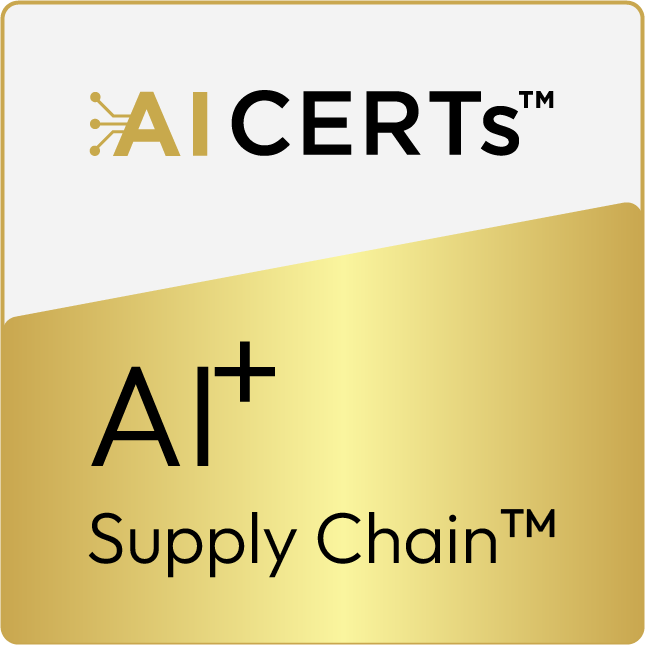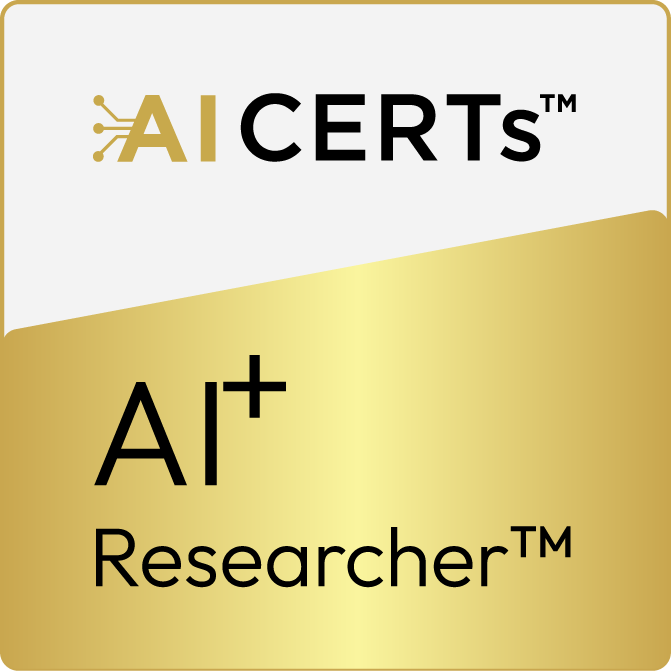AI+ Chief AI Officer™
AP 910
AI Leadership for Chief Officers: Driving Innovation and IntelligenceThis one-day course is designed for C-level executives, focusing on the essential role of the Chief Artificial Intelligence Officer (CAIO) in driving AI strategy, managing cybersecurity risks, and fostering data-driven decision-making. Participants will learn to develop a strategic AI roadmap, build high-performing teams, navigate regulatory frameworks, and assess the business impact of AI initiatives. The course will also emphasize resource allocation strategies and the distinction between short-term and long-term objectives.
Certification Duration: 8 hours (1 Day)
Buy e-Learning Course Buy Instructor-Led CoursePrerequisites
- Must have experience in a leadership or business admin role.
- Basic understanding of business management and strategies.
- Familiarity with fundamental AI concepts and technologies is recommended but not mandatory
Modules
8
Examination
1
50 MCQs
90 minutes
Passing Score
70%
Certification Modules
1.1 Defining Artificial Intelligence
1.2 Key AI Technologies
1.3 The CAIO’s Unique Role
1.4 Navigating Cybersecurity Challenges
1.5 Establishing Cross-Departmental Collaboration
1.6 Case Study
2.1 Aligning AI with Business Objectives
2.2 Setting Measurable Goals
2.3 Identifying Opportunities for Innovation
2.4 Engaging Stakeholders Across Departments
2.5 Monitoring Progress and Adjusting Plans
2.6 Case Study
3.1 Key Roles in an AI Team
3.2 Recruitment Strategies for Top Talent
3.3 Cultivating a Collaborative Culture
3.4 Continuous Learning Initiatives
3.5 Evaluating Team Performance
3.6 Case Study
4.1 Integrating Ethical Frameworks into AI Development
4.2 Conducting Ethical Impact Assessments
4.3 Developing Risk Mitigation Strategies
4.4 Establishing Transparency Protocols
4.5 AI Governance Models and Frameworks
4.6 Case Study
5.1 The Role of Data in AI Initiatives
5.2 Business Impact Assessment Frameworks
5.3 Measuring ROI from AI Investments
5.4 Hypothesis Testing in AI Projects
5.5 Resource Allocation Strategies
5.6 Case Study
6.1 Creating Change Management Strategies
6.2 Communicating the Value of AI Initiatives
6.3 Addressing Resistance to Change
6.4 Metrics for Success Evaluation
6.5 Case Study
7.1 Understanding Generative AI Capabilities
7.2 Identifying Areas for Innovation with Generative AI
7.3 Integrating Generative Solutions into Business Processes
7.4 Managing Risks Associated with Generative Applications
7.5 Creating Interdepartmental Synergies with Generative AI
7.6 Case Study
8.1 Project Overview and Objectives
8.2 Collaborative Work Sessions
8.3 Presentation Skills Workshop
8.4 Final Presentations and Constructive Feedback
8.5 Reflection on Key Takeaways from the Course Experience
Certification Modules
1.1 Defining Artificial Intelligence
1.2 Key AI Technologies
1.3 The CAIO’s Unique Role
1.4 Navigating Cybersecurity Challenges
1.5 Establishing Cross-Departmental Collaboration
1.6 Case Study
2.1 Aligning AI with Business Objectives
2.2 Setting Measurable Goals
2.3 Identifying Opportunities for Innovation
2.4 Engaging Stakeholders Across Departments
2.5 Monitoring Progress and Adjusting Plans
2.6 Case Study
3.1 Key Roles in an AI Team
3.2 Recruitment Strategies for Top Talent
3.3 Cultivating a Collaborative Culture
3.4 Continuous Learning Initiatives
3.5 Evaluating Team Performance
3.6 Case Study
4.1 Integrating Ethical Frameworks into AI Development
4.2 Conducting Ethical Impact Assessments
4.3 Developing Risk Mitigation Strategies
4.4 Establishing Transparency Protocols
4.5 AI Governance Models and Frameworks
4.6 Case Study
5.1 The Role of Data in AI Initiatives
5.2 Business Impact Assessment Frameworks
5.3 Measuring ROI from AI Investments
5.4 Hypothesis Testing in AI Projects
5.5 Resource Allocation Strategies
5.6 Case Study
6.1 Creating Change Management Strategies
6.2 Communicating the Value of AI Initiatives
6.3 Addressing Resistance to Change
6.4 Metrics for Success Evaluation
6.5 Case Study
7.1 Understanding Generative AI Capabilities
7.2 Identifying Areas for Innovation with Generative AI
7.3 Integrating Generative Solutions into Business Processes
7.4 Managing Risks Associated with Generative Applications
7.5 Creating Interdepartmental Synergies with Generative AI
7.6 Case Study
8.1 Project Overview and Objectives
8.2 Collaborative Work Sessions
8.3 Presentation Skills Workshop
8.4 Final Presentations and Constructive Feedback
8.5 Reflection on Key Takeaways from the Course Experience
Exam Objectives
Define AI and Related Technologies:
Demonstrate understanding of key concepts, terminologies, and technologies underpinning artificial intelligence, including machine learning, deep learning, and natural language processing.
Role of the Chief AI Officer:
Describe the strategic role and responsibilities of a Chief AI Officer within a modern corporate structure and its impact on driving organizational success.
AI Strategy Formulation:
Evaluate the components and development process of a strategic AI roadmap that aligns with the organization’s overall business objectives.
Cybersecurity in AI:
Identify potential cybersecurity risks associated with AI deployments and discuss strategies to mitigate these risks within corporate governance frameworks.
Frequently Asked Questions
The course includes an overview of key AI technologies such as machine learning, natural language processing, and neural networks, emphasizing their business applications.
We explore strategies for safeguarding AI systems, including data protection protocols, vulnerability assessments, and how to implement secure AI frameworks.
Yes, the course provides tools and insights for creating a comprehensive AI strategy that aligns with your organization's goals, including stakeholder analysis and technology alignment.
The principles and strategies discussed are designed to be applicable across various sectors, providing insights into how AI can be leveraged for strategic advantage in any industry.
You will learn strategies for assembling and leading teams that are effective in AI project execution, including cross-functional collaboration and resource management.

